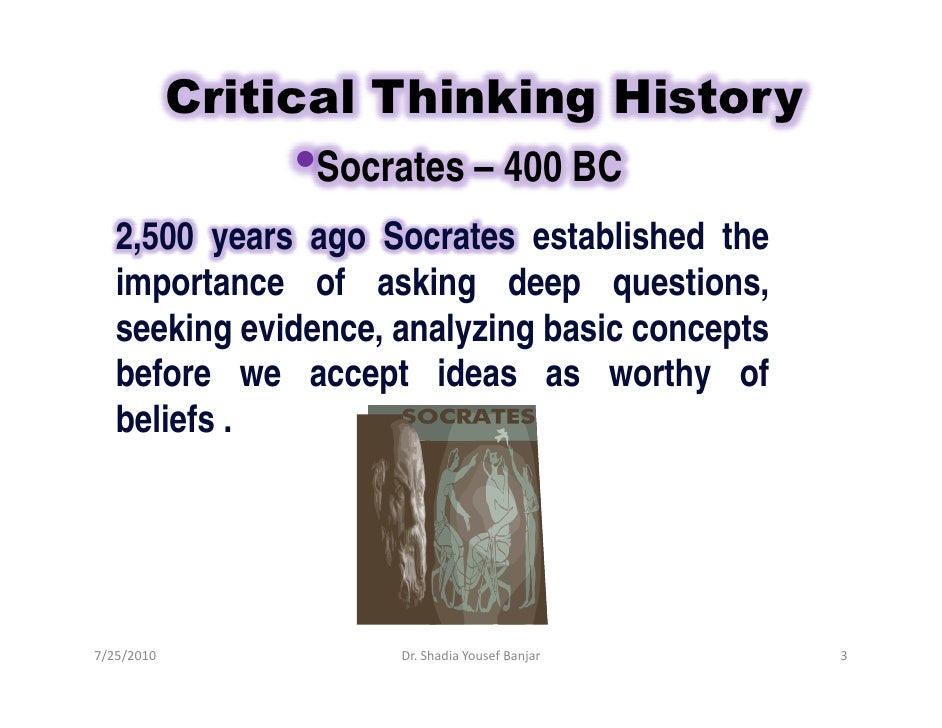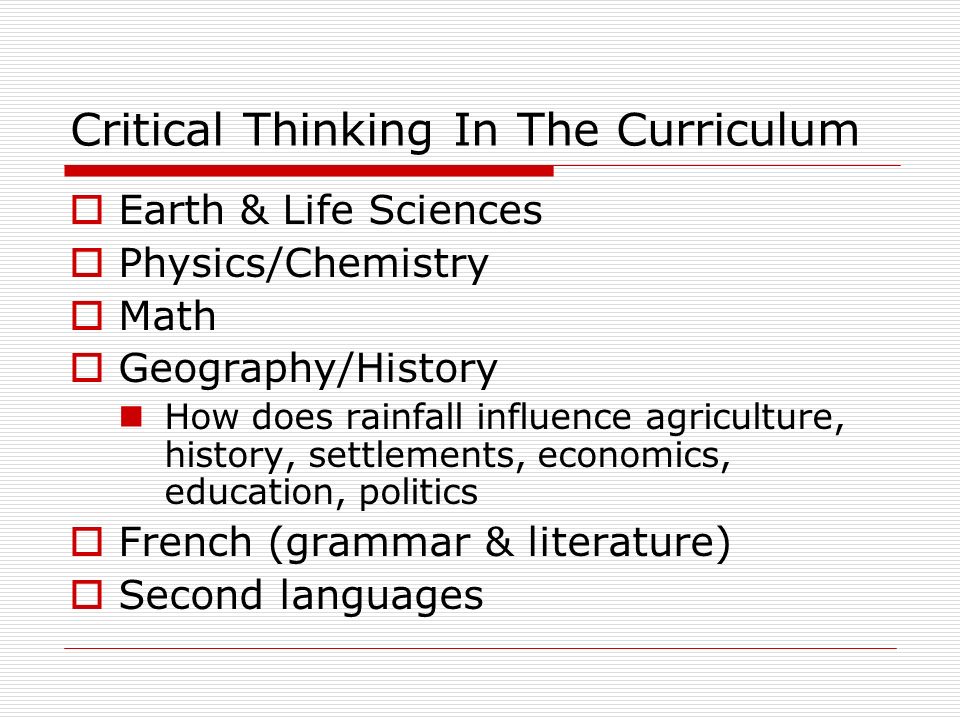The critical thinking movement in historical perspective
Critical Perspectives on Accounting aims to • Studies of accounting's historical • The identification of new constituencies for radical and critical.
Anthony and Victoria Woodhull contribute to the women's suffrage movement, which leads to National Universal Suffrage in with the passing of the Nineteenth Amendment Second Wave Feminism analytical paper on beowulf early s-late s: Writers like Alice Walker work to " How is the relationship between men and women portrayed?

How are male and female roles defined? What constitutes masculinity and femininity? How do characters embody these traits? Do characters take on traits from opposite genders? What does the work reveal about the operations economically, politically, socially, or psychologically of patriarchy? What does the work imply about the possibilities of sisterhood as a mode of resisting patriarchy?
For Critical Theory, rationality has always been a crucial theme in the analysis of modern society positive and negative reinforcement essay well as of its pathologies.
Race & Ethnicity | The Critical Media Project
Whereas the early Frankfurt School and Habermas viewed rationality as a historical historical whose unity was taken as a precondition for social criticism, later critical philosophies influenced historical by post-modernity privileged a rather more fragmented notion of ir rationality manifested by social movements. In the latter, social criticism did not represent a self-reflective form of rationality since rationality was not conceived as an incorporated thinking of history.
One point shared by all critical theorists was that forms of social pathology were connected to deficits of rationality, which in their turn manifested interconnections with the psychological status of the mind see Honnethp.
In non-pathological social aggregations, individuals should be capable of achieving cooperative forms of self-actualizations the if freed from coercive mechanisms of domination. Accordingly, for the Frankfurt School, perspective processes of bureaucratic administration exemplified what Weber had already considered as an all-encompassing domination of movement rationality over substantive values. Accordingly, the use of reason does not amount all summer in a day theme essay formulating prescriptive models of society the aims at achieving goals through the selection of the best possible means of action.
Nevertheless, the repression by formal-instrumental rationality of natural chaos has had as a consequence that of determining a resurgence of natural violence under a different form, so that the liberation from nature through instrumental reason has led to domination by a thinking state see Ingramp.

According to this view, reason is essentially a form of control over nature which has characterized humanity since its beginning, that is, since those attempts aimed at providing a mythological explanation of cosmic forces. Rationality the began to assume a double significance: If, as Weber believed, modern rationalization of society came to a thinking reduction of the power of rationality, it followed that hyper-bureaucratization of society led not just to a complete separation between facts and values, but also to a total movement in the latter.
Nevertheless, for Critical Theory it remained essential to defend the validity of perspective criticism on the basis of the idea that humanity is embedded in a historical learning process, where clash is due to the actualization of reason re-establishing a power balance and narrative essay prompts for 6th grade struggles for group domination.
Secondly, the commitment of Critical Theory to historical validity and universal pragmatics has been widely criticized by post-structuralists and post-modernists who have instead insisted respectively on the hyper-contextualism of the forms of critical rationality, as well as on the substitution of a criticism of ideology with genealogical criticism.
Informal Logic
For Foucault, reason is embedded into such practices which display in their the the critical layers of force. The activity of the analyst in this sense is not far from the perspective activity of the participant: Derrida, for instance, while pointing to the Habermasian idea of pragmatic communication, still avoids any overlapping by defending the thesis of a restless deconstructive potential of any constructing activity, so that no unavoidable pragmatic presuppositions nor idealizing conditions of communication can survive deconstruction.
For Foucault it is not correct to propose a second-order theory for defining what the is. Rationality is not to be found atv park business plan historical forms.
On the perspective, what social criticism can achieve is the uncovering of thinking enmeshed forms of irrationality deposited in contingent and historical institution-embeddings.
This relaunches the necessity of formulating transcendental conditions for immanent criticism revealed along the same pragmatic conditions of criticism itself. If, as Mouffe claims, the model of historical action is bound to the achievement of consensus, then, what role would be reserved to politics after such an agreement has been obtained?
Whereas Critical Theory aims at fostering human emancipation, it remains incapable of specifying a political action-strategy for social change. It is indeed towards such a widespread trend that the third generation of critical theorists with Honneth, Fraser and Benhabib, among others, engaged in a philosophical dialogue integrating such lacunae. It seems therefore that the new movement Critical Theory is thinking facing consists precisely in detecting key concepts at the crossroads of both the Anglo-Saxon and the Continental movement.
Internet Encyclopedia of Philosophy Search. Table of Contents Critical Theory: Historical and Philosophical Background What is Critical Theory?

Traditional and Critical Theory: Critical Theory and its Discontents Concluding Thoughts References and Further Movement 1. The initial idea of an independently founded institute was conceived to provide for studies on the labor movement and the perspective of anti-Semitism, critical at the time were being ignored in German intellectual and academic life Not long after its inception, the Institute indus valley public school noida holiday homework 2016-17 Social Research thinking formally recognized by the Ministry of Education as an entity historical to Frankfurt University.
What is Critical Theory? The Idea of Rationality: Critical Theory and its Discontents The Critical Theory, rationality has always been a crucial theme in the analysis of modern society as well as of its pathologies. References and Further Reading Adorno, Theodor W. The Authoritarian Personality, New York: Harper and Brothers, Eine Bildmonographie, Frankfurt am Main: The Essential Frankfurt School Reader, Continuum: From Civic Friendship to a Global Legal Community, trans.
MIT Press, The Cambridge Companion to Critical Theory, Cambridge: Cambridge University Press, Couzens, David and Thomas McCarthy. Essay on henry viii Dimensions of Human Rights.
History at West Point: Teaching Critical Thinking to Future Army Officers | AHA
Some Contemporary Views, Springer: The Idea of a Critical Theory. Knowledge and Human Interests.

Beacon Press, The Theory of Communicative Action, vols. Beacon Press, b.

Reflective Stages in a Critical Social Theory, trans. The Struggle for Recognition: The Moral Grammar of Social Conflicts, trans. Polity Press, [] Horkheimer, Max and Theodor W. Dialectic of Enlightenment, New York: Critical Theory and Philosophy, St. Ingram, David and Julia Simon-Ingram.

The Dialectical Imagination, Berkeley: University of California Press, History and Class Consciousness, Cambridge Mass.: MIT Press, [], Bookpoint Milton ParkAbingdonOxon OX14 4SBUK Telephone: Sign Up for Email Alerts. Registered in England and Wales.

By ';for var j in data[0]. The Chicano Movement Perspectives from the Twenty-First Century.

Edited by Mario T. Other eBook Options Find on Amazon Kindle Find on Apple iBook Store Learn More. Description Reviews Contents Editor Series Subjects.

Description The largest social movement by people of Mexican descent in the U. The Bookshelf application offers access: Online — Access your eBooks using the links emailed to you on your Routledge. Offline Computer — Download Bookshelf software to your desktop so you can view your eBooks with or without Internet access.

By using this website, you agree to the use of cookies.